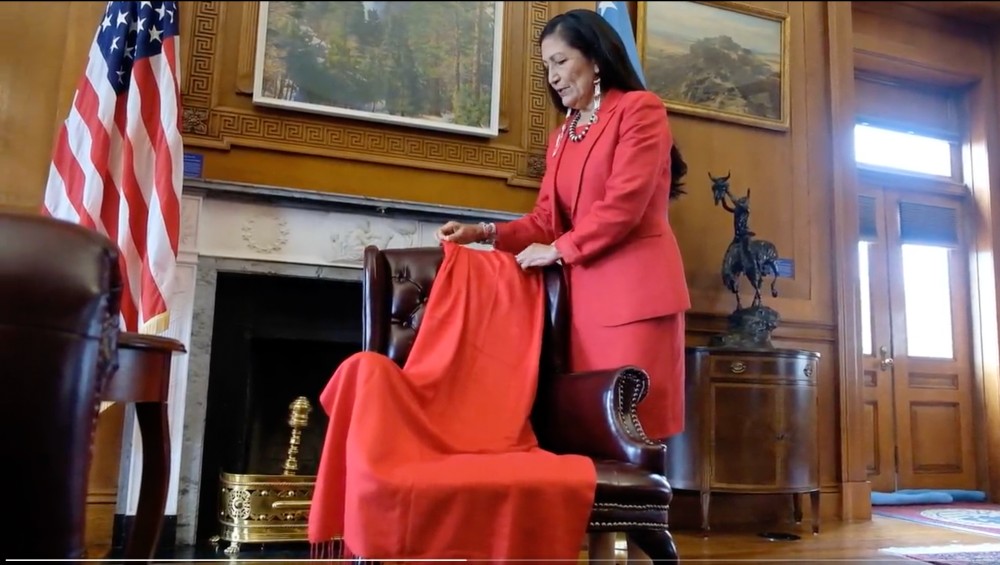
- Details
- By Kelsey Turner
On May 5, National Missing or Murdered Indigenous Persons Awareness Day, the Department of the Interior (DOI) and Justice Department held a virtual livestreamed event with Native panelists commemorating the day and recognizing newly announced members of the Not Invisible Act Commission.
“I wish we didn’t need to be here,” Secretary of the Interior Deb Haaland, Laguna Pueblo, said at the start of the event. She wore a red dress to honor the Missing or Murdered Indigenous Persons (MMIP) movement, which uses the color red to call attention to the crisis. “I wish that this day was obsolete and that we didn’t have to keep fighting year after year for our people to be honored and respected.”
The Not Invisible Act Commission, a joint advisory committee of the DOI and Justice Department, was established by the Not Invisible Act, which Haaland sponsored during her time as congresswoman. Yesterday, the DOI announced the commission’s members, including tribal leaders, law enforcement, federal partners, service providers, family members affected by the MMIP crisis and – “most importantly” – survivors.
Commissioners will hold hearings, gather testimony, and make recommendations to the Secretary and Attorney General. These recommendations can help improve coordination across government agencies and establish more resources for survivors and their families.
“The MMIP crisis is one that communities have faced since the dawn of colonization. For too long, this issue has been swept under the rug by our government with a lack of urgency, attention or funding,” Haaland said at the event. “This commission will ensure that we hear the voices of those who are most impacted by this issue. It includes diverse experiences, backgrounds and geographies to provide balanced points of view.”
Lucy Simpson, executive director of the National Indigenous Women’s Resource Center and a panelist at the event, discussed the importance of “real and meaningful coordination” between federal agencies in fulfillment with the government’s ongoing trust responsibility to tribes. “But the federal government cannot do it alone, nor should it,” Simpson added. “As the Not Invisible Act Commission membership shows, we need a broad coalition to create true social change.”
Haaland has taken several actions within the Biden-Harris Administration confronting MMIP. In her first year as secretary, she helped form a new Missing and Murdered Unit (MMU) within the Bureau of Indian Affairs Office of Justice Services to provide leadership and coordinate interagency efforts addressing the crisis.
“Since the launch of MMU, the department has built up personnel and increased infrastructure capacity by launching new offices,” Haaland said. “Today, 17 BIA offices located throughout the nation have at least one agent dedicated to solving missing and murder cases for American Indians and Alaska Natives.”
The BIA’s MMU website posts critical information about missing and murdered individuals, including case profiles that can be easily shared via social media, as well as ways to submit tips that could help investigators solve cases and give families closure.
During yesterday’s event, Deputy Attorney General Lisa Monaco also announced the creation of a new National Native American Outreach Services Liaison position. The liaison will work in the Justice Department’s Executive Office for U.S. Attorneys to ensure the voices of survivors and their families are heard throughout all stages of the criminal justice system. “This new position is part of a larger effort to raise awareness and increase outreach on the MMIP crisis,” Monaco said.
National Congress of American Indians President and panelist Fawn Sharp highlighted that, though funding for public safety in Indian Country has increased, there is still a long way to go. “In 2017, the BIA estimated it funded only 21% of law enforcement, 49% of detention centers, and 3% of tribal court needs,” she pointed out. “Tribal leaders have continued to share that the lack of security and sustainable funding has prevented us from holding perpetrators accountable.”
Haaland recognizes this chronic underfunding of resources and will look to the Not Invisible Act to ensure federal dollars are being used most effectively, she said. Meanwhile, the Not Invisible Act Commission is the department’s next step in addressing this crisis and its underlying roots.
“People who have had an empty chair at their kitchen tables, loved ones who tirelessly searched or their relatives, service providers who hear the heartbreaking stories of family members of the missing,” she said. “I want you to know that I see you and I stand with you.”
More Stories Like This
Native News Weekly (August 25, 2024): D.C. BriefsShowing Up When It Matters: Flanagan’s Response to Minnesota’s Immigration Crisis
Monday Morning: (February 23, 2026): Articles You May Have Missed This Past Weekend
Native American Students Lead Protest Against ICE Presence at Haskell Indian Nations University
Native News Weekly (February 22, 2026): D.C. Briefs
Help us defend tribal sovereignty.
At Native News Online, our mission is rooted in telling the stories that strengthen sovereignty and uplift Indigenous voices — not just at year’s end, but every single day.
Because of your generosity last year, we were able to keep our reporters on the ground in tribal communities, at national gatherings and in the halls of Congress — covering the issues that matter most to Indian Country: sovereignty, culture, education, health and economic opportunity.
That support sustained us through a tough year in 2025. Now, as we look to the year ahead, we need your help right now to ensure warrior journalism remains strong — reporting that defends tribal sovereignty, amplifies Native truth, and holds power accountable.
 The stakes couldn't be higher. Your support keeps Native voices heard, Native stories told and Native sovereignty defended.
The stakes couldn't be higher. Your support keeps Native voices heard, Native stories told and Native sovereignty defended.
Stand with Warrior Journalism today.
Levi Rickert (Potawatomi), Editor & Publisher

